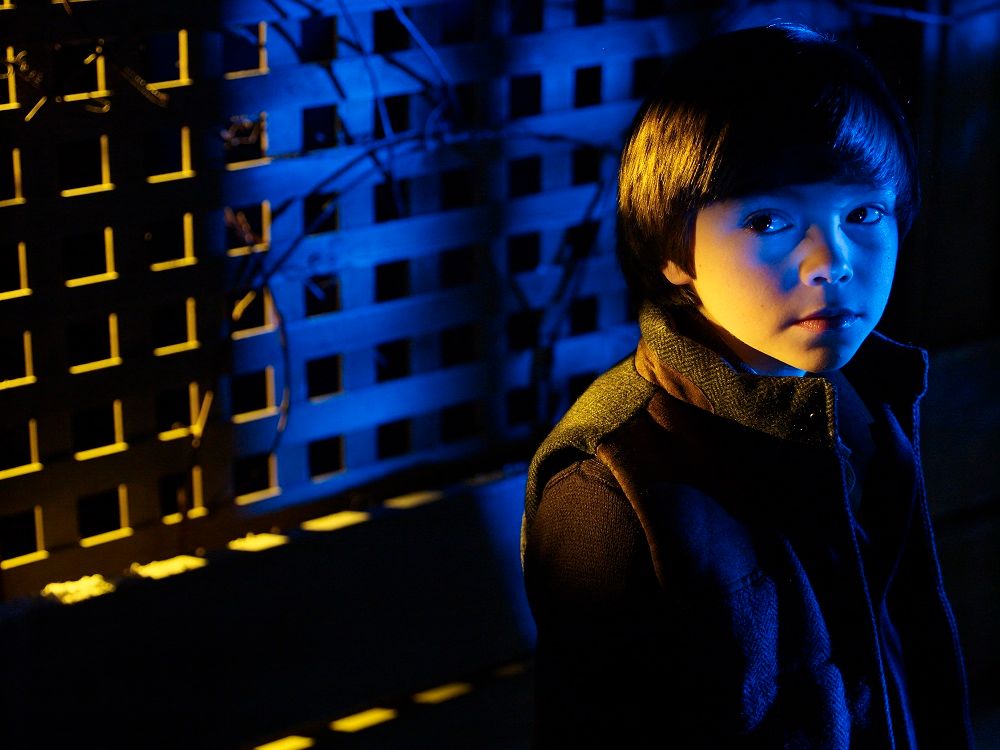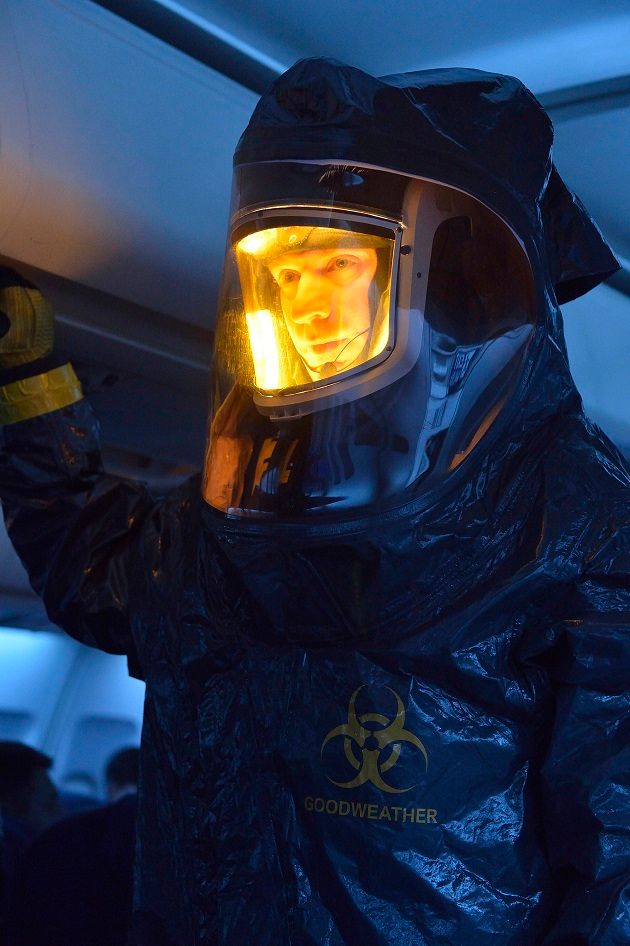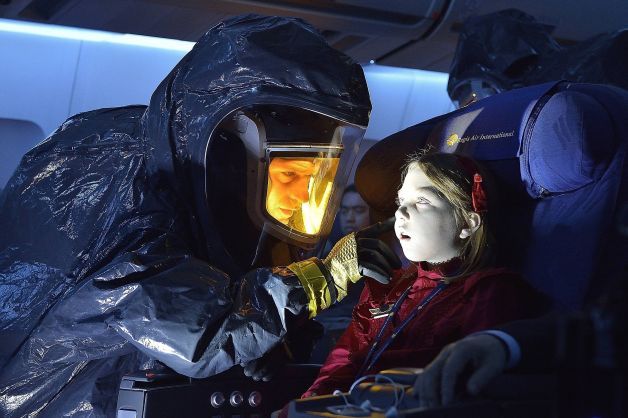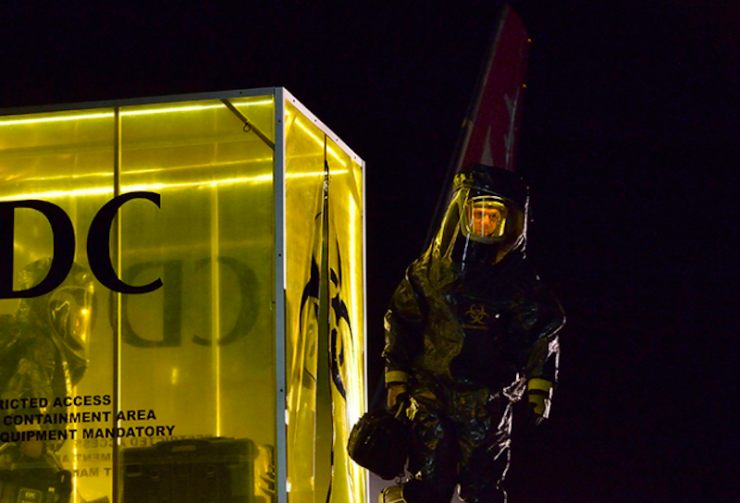If you’ve kept up with Netflix’s hit series House of Cards, you already know Corey Stoll is a commanding leading man. As Congressman Peter Russo, he struggled memorably against Kevin Spacey’s Frank Underwood, becoming a perfect sort of victim-slash-counterpoint to the Machiavellian schemes of his co-star’s character. But in The Strain, Stoll seems almost to switch roles, insofar as he’s the guy we’re following, and yet not necessarily the one we care about or sympathize with – which is no small challenge given that the new FX series is about a viral outbreak that proves to be an epidemic of vampires.
In March, Spinoff Online visited the Toronto set of The Strain, where Stoll and his fellow cast members spoke with journalists about the terrifying world within the series. In addition to talking about that strange, conflicted dimensionality of his character, Stoll discussed his excitement over working with a visionary like Guillermo del Toro, who co-wrote the novels on which the thriller is based, and offered some insights into what audiences can expect from the intense, complicated, and evidently very scary, new drama.
Can you introduce us to your character and how he fits into the story?
Corey Stoll: I play Dr. Ephraim Goodweather who is the head of the CDC [Centers for Disease Control] in New York. I'm in charge of dealing with outbreaks as they happen in the city, and sort of coordinating the CDC response. I am the first on the scene, there's a plane that has gone dead in JFK. And I try to make heads or tails of it. I can make neither.
It's pretty obvious in the pilot that your character understands science better than he does relationships. Could you elaborate on that and discuss how much you play up his love of science and how much that gets in the way of his relationships with other characters?
Yeah, it's interesting, in the lead-up to the pilot, during some sort of conversation, Guillermo had sort of mentioned an almost, sort of Asperger’s quality to the character. I was sort of playing with that for a while, and that really didn't really make sense. It was sort of too far in that direction. But he definitely is a narcissist. The model that Guillermo kept on referring to was Orson Welles. He was sort of a model for the character: the boy genius who had succeeded in everything in his life, up until when we see him, and then suddenly the guy who went to college early, Rhodes scholar, was incredibly successful and an idealistic doctor, now that he's maybe not so young … everything is sort of coming crashing down all at once. And he really doesn't have the skills to deal with failure. That seems like a really fertile ground to play in.
Carlton Cuse Exhumes the Horror, and Science, of “The Strain’s” Vampires
You worked with Ben Hyland before. How did you come to work with him again, this time playing your son?
That was my suggestion. We were looking for kids, and I said, "This kid is great, he's the real deal." We could tell on set. It wasn't just that he was able to be good in the cut, when we were doing House of Cards. He was always on and always playful and always professional, and just a great kid to be around.
What is it you love about that father-son dynamic? He was saying that, "I like my dad. Nobody else does, but I love my dad."
I think that's very well put. And you can see really clearly in the pilot that he's not Leave It to Beaver. He's a tough kid who's had to deal with a father who clearly loves him, but doesn't quite know ... he isn't always there. He always says he's going to be there, and he's always late.
How do you compartmentalize his achievements with his failures?
I think, for him, they become a sort of a zero-sum game. The more successful he is, the more he has to sacrifice his personal life. He hasn't really found that ability to harmonize those two things.
You are the head of the CDC, which is very medical and practical. Can you talk about some of the signs or evidence that convinces him that this isn't some sort of medical problem?
Well, he's not quite there yet. I don't think he is convinced that it isn't, at least where we are now, in the story. And it's sort of a hybrid, which is very, very Guillermo. Guillermo is incredibly carnal, and he's really interested in the profane and the physical and the anatomical in a very molecular level. But he's also very interested in the mythological and the spiritual. I think for him, for Guillermo, where those two things meet is where he finds his inspiration. It's actually more interesting that they're both right -- that [Abraham] Setrakian, who has lived with the seemingly irrational way that the infection takes over people, and my very rational way of looking at it. Neither of us are 100 percent right, and I think that makes it more interesting.
Did you spend any time in the CDC doing research?
No. I read a couple books about this thing called The Coming Plague. I re-read And the Band Played On, about the AIDS crisis, which is really interesting.
Do you touch your face and wash your hands a lot?
No, I'm terrible. If you look in the pilot, I'm touching my face all the time.
Did the rat talk with Kevin Durand get to you at all? Do you lie awake at night thinking you can hear things scurrying in your walls?
No… I think they're cute.
Mia Maestro on Viruses, Vampires and Being the Heart of Del Toro's "The Strain"
So you're saying, you're able to let go of your character ...
You know, it's funny. There's a lot of really disturbing stuff, and most of these effects are practical. So, when somebody's head is bashed in there is an incredible life-like body right in front of you, with its head bashed in. I've never seen anybody with their head bashed in, but it looks real to me. You do take that home with you. But rats never really bothered me.
In House of Cards and this, you're the driven family man. Of course, he was failing at his job to a degree in House of Cards. It's like success and failure living together.
Yeah, but he… I don't know, I don't want to start psychoanalyzing Peter Russo, because let him rest in peace. He was nowhere as good as his job as Ephraim is, nor was he coming at it for the same reasons. After he sold out his district he had a more idealistic reason for doing what he was doing. But Peter Russo was really much more about pure ambition and addiction. I think his success in politics was of a piece with his addiction.
He's much more noble?
Eph is? Yeah, he's much more noble. He's trying to save the world.
How aware is Eph of his shortcomings and his faults? Because it seemed that in the pilot, Nora had to be the one who was bringing him to reality.
In keeping with this boy genius who is only starting to now fail … We're in Episode 10 now and he's starting to, starting to sort of understand that he's not Superman. But self-awareness is not his best trait.
We saw [in the pilot] how Eph deals with the mass amount of death on the plane, but that was presumably chemical. How does he deal with violent death and actual violence being thrust in his face? Does he step up or run away?
A little bit of both. Exactly, I think that's it. I think for him he's aware of the imminent danger and reacts with appropriate force. But it's the lack of any sort of rational explanation at a certain point that really freaks him out. Much more than the sort of, how gross these kind of things are.
How are you dealing with being captain of the ship?
I guess you'd have to ask my crew. I'm not the captain of the ship; Guillermo's captain. I show up and do my work.
I've often heard it said that the attitude of No. 1 on the call sheet helps to set the tone.
Yes, and I'm very aware of that, definitely. And, you know, I just try to do the best job I can.
What did you learn from Kevin Spacey in that regard?
Well, I can't do what Kevin Spacey does. Kevin is so charming and funny. It would be folly, for me, to take on some personality that isn't mine. The way that I've always worked is, I try to make every scene that I'm in work as well as it can. That's sort of the beginning and ending of my job, I think. And to, obviously, be kind.
This show straddles science and the supernatural but how do you ground something that is basically a guy in a really scary suit? How do you make that real every single take?
That stuff feels pretty real. I don't see the tongue coming out at me. But it's all just make-believe, whether you're doing a Müller play or you're doing this. It's showing up and you have lines that you didn't write, and you're doing things that you didn't decide to do. You have hair. It's make-believe. Sometimes that can be as emotionally real as anything. And sometimes you're just faking it. But the audience doesn't know the difference, hopefully.
Your character rolls with the punches in the series. How important was it to read the books and understand his arc, as opposed to just getting each script and rolling with the punches?
I think the books are more important for understanding the world that you're in. It's easy to lose track of the scale of what's happening, and the tone when you're just going scene to scene. But in terms of the character, the character is being laid out in the writer's room and on set. The Eph that's in the book is the start of the focus.
Did you and Natalie [Brown] talk at all about what their relationship was like before it went south? What do you think that was like?
Sure. I think it was a whirlwind, I think it was very passionate, and I think they were perfect for each other. I think that work-life ratio continued to steadily become out of balance.
Why do you think he couldn't pull it back?
I don't know, he just couldn't. Whether it was he was so engaged in his work or just didn't. … I think a lot of it was just sort of him not believing in the consequences. The consequences are so dire and so concrete in his job. It just sort of seems that when you're having a debate between whether I was on time for soccer practice or I dealt with this outbreak of the measles in Brooklyn. Yeah, this is life or death. But unfortunately, that's the constant nature of his job. So that's going to constantly win out.
How easy is it to apply that psychological veneer to everything he does? The idea that he's fighting for a relationship that she's over. How much of that do you see as his own sense of, "This is something that I thought I succeeded at that's failing" versus, "I'm completely emotionally committed to this person?"
Yeah I think from his point of view, he doesn't understand that he's failing for the first time. He's sort of fighting each battle as they come along. Constitutionally, he's a fighter. He's one of those people that always has to be right. He can't not scratch that itch.
Supernatural projects can have such a niche audience. Why do you feel this will appeal to a broad audience as opposed to just the supernatural fanatics? Why would someone who doesn't like horror movies, tune into this?
I think there is a unique quality to the way Guillermo del Toro tells a story that is inclusive. Things are scary, but there's this whimsical quality to them at the same time. I find it inviting in a very strange way. And hopefully other people, I think, will.
You mentioned earlier that you were drawn to the boy-genius aspect of Eph. Why do you think the audience will be drawn to Eph? Why do you think they will like him?
[Laughs] I don't know, I hope they do. There is sort of a blowhard quality to him, but there's also a quality that he's saying (sort of) what the audience wants to say. Because the audience hasn't seen a vampire, and they would probably want to deal rationally with the situation and encountering this irrational belief. At least I think a certain part of the audience that would react that way, I think I would.
There’s obviously a lot of science in it, but then again there still was a giant coffin filled with dirt that they came across. Are we going to hit a point where someone goes, "This is Dracula! Is anyone else seeing that this is Dracula here?"
I don't think it was until episode 6 or 7 the word “vampire” was even used. And I think it's important that that tension between science and mythology is maintained. Once we totally let go of any sort of biological or physical reality there's a very juicy tension that we can use there. So a lot of that is manifested in my relationship with Setrakian, [David] Bradley's character, who has bought this mythological world view 100 percent.
Does saving the world become more about saving his child?
Not yet. It will.
You'd think that would be the first thing on his mind. But I guess he's used to dealing with contagions that don't touch his family.
Yeah. I don't want to give too much away for people who haven't read the books, but that is sort of Eph's journey. I think at a certain point humanity doesn't really stand a chance.
Is he going to have to choose at a certain point between doing something to save humanity and doing something to save his son?
He will. And the people who've read the book definitely know.
Have you talked about the end of the series? It's such a big ending.
That's so far away. Yeah, I have no idea if the ending of the series will be anything like the book, because so many characters are going to be introduced that aren't in the book. We just did this very big, probably the biggest episode of the season, and it's not in the book at all. I think what Carlton [Cuse, the showrunner] brings to the series is an incredible amount of experience and a very smart world view. A way of dealing and knowing TV, and telling stories episodically. And how you can take in what's working and what's not working and be a lot more agile that way. That's sort of what's exciting is we know we have this book, the writers have this book that they can always go back to as a road map. But if something is really working that nobody really expected to work, they can follow that line and the story can spinoff into its own and maybe be its own thing. From my understanding they're not beholden to anything.
The Strain premieres Sunday at 10 p.m. ET/PT on FX.





